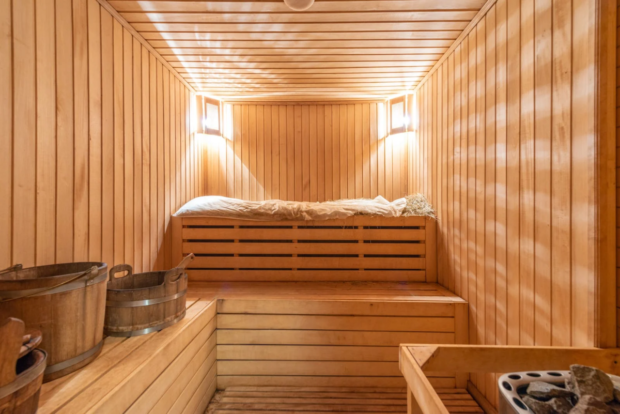How and Why Athletes Use Sauna To Recover
Athletes of all levels strive to maximize their performance, and recovery is a key element in achieving peak athletic potential. One important tool used by many athletes for recovery is sauna therapy. Sauna use helps relax muscles, flush out toxins, reduce inflammation, and improve circulation – all important components of an effective recovery program. In this article, we will explore how and why athletes use saunas to recover from strenuous workouts or competition.

1. Heat Exposure
Athletes use saunas for their heat-generating capabilities. The rise in temperature helps relax muscles, which is especially beneficial after a strenuous workout or competition. Sauna therapy can also reduce inflammation caused by intense activity, and help the body get rid of toxins through sweat. Heat exposure also increases blood flow to the muscles, providing more oxygen-rich nutrients to help with injury recovery. Athletes can buy a sauna for home use, or visit a spa to gain access to a professional-grade sauna. It is important to remember that proper hydration and frequent breaks are necessary when using saunas for recovery.
2. Relaxation Benefits
In addition to physical benefits, athletes often find relaxation benefits from sauna therapy as well. Spending time in a sauna can be a calming experience that reduces stress levels and encourages healthy sleeping patterns. Studies have shown that regular sauna sessions can improve mental well-being and enhance overall performance due to increased relaxation and better sleep. Also, athletes can use saunas to relax during an off day or take a break from training and competition. The combination of physical and mental benefits makes sauna therapy a popular recovery tool utilized by athletes.
3. Improved Circulatory System
Heat exposure in the sauna helps improve circulation in the body by dilating blood vessels and allowing more oxygen-rich blood to reach muscles. This improved circulation can help with muscle recovery, reduce inflammation, and promote tissue healing after a strenuous workout or competition. The heat from a sauna also encourages sweating which can flush out toxins from the body and help regulate core temperature. It is important to note that athletes should stay properly hydrated while using saunas for recovery. So, it is advisable to drink plenty of water before, during, and after sauna use.
4. Reduced Muscle Soreness
Regular sauna use has been linked to reduced muscle soreness due to its ability to relax muscles, improve circulation, and encourage sweating. Studies have shown that athletes who use saunas for recovery experience less DOMS (Delayed Onset Muscle Soreness) and are able to return to their training regimes more quickly. There is also evidence to suggest that sauna therapy can reduce the risk of injury by improving flexibility and range of motion. Also, saunas can be used for post-workout stretching sessions, which is beneficial for injury prevention and muscle recovery. You can also use a sauna to relax after a hard workout or competition.
5. Improved Immune System
Using a sauna for recovery can also boost the immune system by helping to flush out toxins from the body. Sweating is a natural method of detoxification, and studies have shown that regular sauna use can reduce inflammation and improve overall health. Athletes who maintain good hygiene habits while using saunas can further benefit from improved immune health and reduced risk of illness. Some athletes even use saunas to help speed up the recovery process after an illness. The key is to listen to your body and make sure you are taking proper precautions while using saunas for recovery.

6. Improved Performance
Overall, sauna therapy can be an important tool for athletes looking to maximize their performance. Heat exposure helps relax muscles and flush out toxins, which can improve recovery time and reduce muscle soreness. Additionally, regular sauna use can help reduce stress levels and regulate sleeping patterns, enabling athletes to perform at their peak. If you are looking for an effective way to recover and improve your performance, sauna therapy is a great option. While using saunas for recovery, it is important to keep proper hydration and take frequent breaks. Every athlete is different, so it is best to consult with a doctor or trainer before starting an at-home sauna regimen.
7. Safety
It is important to follow all safety guidelines when using a sauna. Proper hydration and frequent breaks are necessary, as the heat can cause dehydration or dizziness if not taken seriously. It is also recommended that athletes check with their doctor before beginning any type of sauna therapy program. Additionally, it is essential to use clean linen and limit contact with other people in order to prevent the spread of germs or bacteria. If done safely and correctly, sauna therapy can be an effective way for athletes to recover and improve their performance.
Heat exposure, relaxation, and improved circulation can all help to reduce muscle soreness and increase overall health.
Is it expensive to buy a sauna?
The cost of purchasing and installing a sauna will vary depending on the type and size of the unit. Home-use saunas typically range from $1,500 to $4,000 in price with installation costs included. Professional-grade commercial saunas can be more expensive but are built to last longer and offer more features than home units. Additionally, there may be monthly fees associated with using a public spa or gym that has professional-grade saunas available for use. You can also rent a portable sauna for short-term use.
Some people find that the cost of a sauna is worth it due to the various physical and mental benefits that come from using one for recovery. If you are considering purchasing a sauna, it is important to weigh the cost against the potential benefits.
Heat exposure can help relax muscles, reduce inflammation, flush out toxins, and improve circulation; all of which help with injury prevention and improved overall performance. Additionally, regular sauna use has been linked to increased mental well-being due to reduced stress levels and improved sleep quality. As such, many athletes incorporate saunas into their recovery routines in order to achieve peak athletic potential. So, whether you’re a professional or weekend athlete, using saunas to recover from workouts and competitions may be beneficial for improving overall performance.
